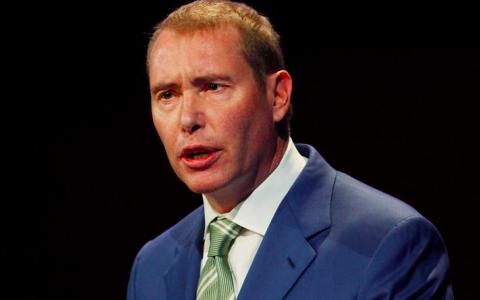
(Yahoo) A group of top investors and strategists are highlighting risks they’re paying attention to in 2020, including the U.S. presidential election.
As the Senate weighs whether President Donald Trump should be removed from office, recent national polls suggest leading Democrats would best him in a general election. As a result, investors are weighing which contenders might be better (or worse) for markets and the economy.
The risks were highlighted during DoubleLine Capital CEO Jeffrey Gundlach’s inaugural Round Table Prime. The event featured a mix of industry leaders, and was moderated by deputy CIO Jeff Sherman. And according to participant Jim Bianco of Bianco Research said his biggest risk is the 2020 election.
“If you were to look at the standards modeling of the election and just say, ‘Here is an incumbent, here’s what we’ve done with the economy, here is what we’ve done with unemployment, here is what the equity market has done; it’s a 48- state landslide, is what it should be,” Bianco said.
“Then you put the name ‘Donald Trump’ in there, and all of a sudden, it becomes a 50/50 race.”
While investors would be “okay with” former Vice President Joe Biden, they shouldn’t count out a victory by Vermont Senator Bernie Sanders .
“There is a lot of political risk in this market more than people are willing to acknowledge,” Bianco added.
DoubleLine’s founder Jeffrey Gundlach said he thinks there will be “a moment where the market has to try on the idea of Bernie for real,” now that Massachusetts Senator Elizabeth Warren appears to have lost momentum.
Investors “never believed in Elizabeth Warren. We saw that. She was an ascendant for a brief moment, perhaps the frontrunner. Nothing happened,” he said.
“But Bernie, I believe, is stronger than people think, and [the] market is going to have to deal with that,” Gundlach added.
Ed Hyman of Evercore ISI agreed, calling the 2020 election “unpredictable.” While he didn’t believe Sanders would win, “I happen to think if Bernie is the nominee, the odds of him being elected are pretty low, but that’s a different issue.”
More than just politics
Stock market prices are being distorted by the proliferation of index investing, which is likely to unwind in an ugly way, according to experts.
The topic on the future of indexing came up during the DoubleLine Capital inaugural Roundtable Prime hosted by CEO Jeffery Gundlach. Gundlach noted that the indexation of equities is “the definition of momentum investing”.
“When it comes to indexing, it’s remarkable how the pendulum swings,” said Gundlach, adding that in the 1990s, people sought active management for equities whereas these days people want indexing for their stocks.
Although some have raised the question of whether there is enough underlying liquidity in the stock markets, there has been a rotation out of actively managed funds into passively managed indexed equity funds and exchange-traded funds (ETFs).
“You can’t have something that ostensibly is liquid on the surface and yet invest in the yield illiquid. That’s ETFs and other index funds, they’re investing in, particularly in the illiquid,” said Stephen Romick, a portfolio manager with First Pacific Advisors.
Gundlach sees “very little downside on oil,” and expects crude-related price gains are likely.
Economist David Rosenberg told the forum that his biggest risk is that a robust jobs market starts to falter — and the consumer follows the other parts of the economy into a downturn. That may prompt the Federal Reserve to resume stimulative monetary policy, in the form of rate cuts, he said.
“I think that we’re going to go down on the funds rate probably below 1%, and I think the whole yield curve is going to steepen,” Rosenberg added.
Gundlach agreed with Rosenberg that the Treasury yield curve should steepen, as investors pull money out of bonds. That should prevent the 10-year Treasury rate from setting a new low.
Danielle DiMartino Booth, the CEO of Quill Research, saw similar risks for the consumer spending, which she estimated was 90% of gross domestic product (GDP) last year.
“We’ve never seen the consumer literally be the entire economy,” DiMartino Booth said. “So, I certainly see a risk to consumption over the horizon.”
Steven Romick, a portfolio manager with First Pacific Advisors (FPA), said his best idea is to stay away from the corporate bond market.
“I think you can have a buyer’s strike on corporate bonds, which can be a function of a recession, and risk premiums getting longer. So it’s an area we want to avoid,” Romick said.
“Because the next downturn, I would argue that the default rate would be higher and the recovery rate is going to be lower,” he added. “And so for those reasons, we just want to avoid — which is one of the reasons why we end up with a lot of cash in our portfolios.”
Gundlach echoed Romick, noting that “sometimes it’s what you don’t do that makes you succeed.” He added that the lower-rated BB corporate bond market is “about as unattractive as I’ve ever seen it in my career.”



